9a第五单元教案1
牛津译林版九年级英语Unit5 Art world全单元精美导学案(英语教案)
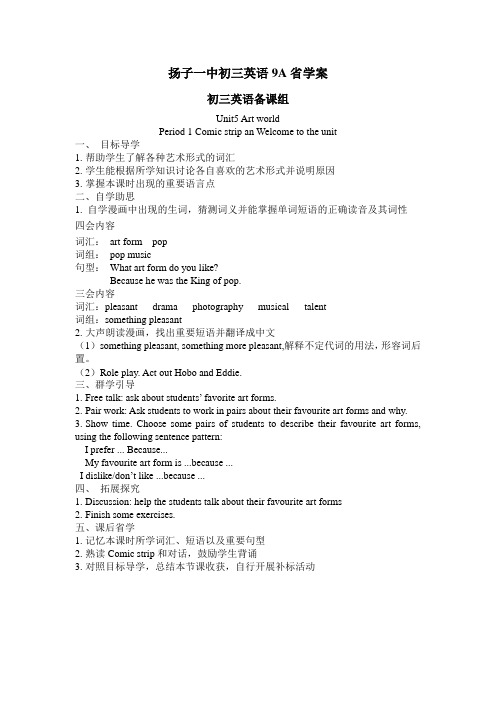
3.Show time. Choose some pairs of students to describe their favourite art forms, using the following sentence pattern:
I prefer ... Because...
My favourite art form is ...because ...
I dislike/don’t like ...because ...
四、拓展探究
1.Discussion: help the students talk about their favourite art forms
1.Revision
Name
Place of birth
_____________,China
Features of his music
Using ________ like stones, paper and water to make music
Using ______ in his music
四会内容
词汇:art form pop
词组:pop music
句型:What art form do you like?
Because he was the King of pop.
三会内容
词汇:pleasant drama photography musical talent
词组:something pleasant
2.对照目标导学,总结自己本节课收获,自行开展补标活动。
人教版九年级英语全册Unit5SectionB2a2b教学设计

-教师提问:“What do you think are the key factors to success?”,引导学生分享对成功的看法。
3.分层教学:针对不同学生的学习水平,设计不同难度的练习,使每个学生都能在原有基础上得到提高。
7.教学评价:采用多元化评价方式,关注学生的语言能力、合作意识、情感态度等方面的发展。
-结合课堂表现、作业完成情况、小组活动等,全面评价学生的学习效果。
四、教学内容与过程
(一)导入新课
1.教师以一个名人故事引入新课,如讲述马云创立阿里巴巴的经历,引导学生思考成功背后的因素。
-提问:“Can you guess what made Ma Yun successful? What do you think are the key factors to his success?”
-提示:可以从词典、网络资源、英文文章中寻找相关词汇和短语。
5.课后反思:回顾本节课的学习内容,思考以下问题,并在下节课上与同学分享:
- What have you learned from the success stories of celebrities?
- How will you apply these lessons to your own life and studies?
1.写作练习:请结合本节课所学的重点词汇和语法知识,以“Fame and Success”为主题,写一篇英文短文。要求不少于80词,描述你心目中的一个成功人士,并阐述他/她的成功原因。
-提示:可以从名人的努力、坚持、团队精神等方面入手,结合具体事例进行描述。
2.小组活动:小组内讨论并分享各自采访家人或朋友的成功经历。每组选取一个最具启发性的故事,准备在下节课上进行课堂展示。
部编版九年级语文上册第五单元主题阅读《第1课时单元预习课名师教案》
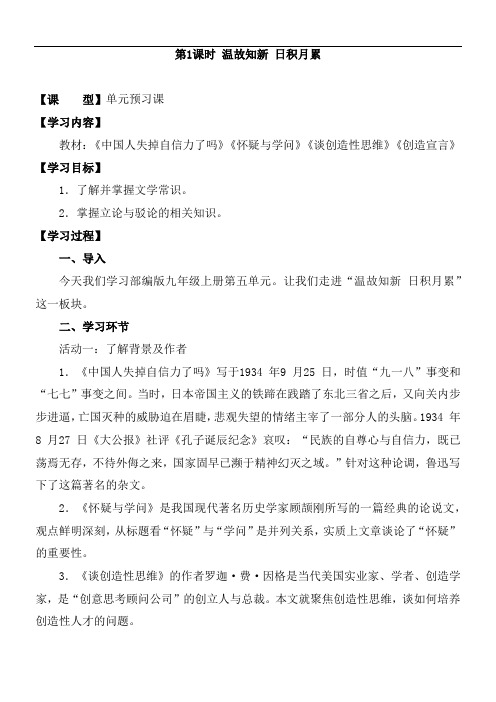
第1课时温故知新日积月累【课型】单元预习课【学习内容】教材:《中国人失掉自信力了吗》《怀疑与学问》《谈创造性思维》《创造宣言》【学习目标】1.了解并掌握文学常识。
2.掌握立论与驳论的相关知识。
【学习过程】一、导入今天我们学习部编版九年级上册第五单元。
让我们走进“温故知新日积月累”这一板块。
二、学习环节活动一:了解背景及作者1.《中国人失掉自信力了吗》写于1934 年9 月25 日,时值“九一八”事变和“七七”事变之间。
当时,日本帝国主义的铁蹄在践踏了东北三省之后,又向关内步步进逼,亡国灭种的威胁迫在眉睫,悲观失望的情绪主宰了一部分人的头脑。
1934 年8 月27 日《大公报》社评《孔子诞辰纪念》哀叹:“民族的自尊心与自信力,既已荡焉无存,不待外侮之来,国家固早已濒于精神幻灭之域。
”针对这种论调,鲁迅写下了这篇著名的杂文。
2.《怀疑与学问》是我国现代著名历史学家顾颉刚所写的一篇经典的论说文,观点鲜明深刻,从标题看“怀疑”与“学问”是并列关系,实质上文章谈论了“怀疑”的重要性。
3.《谈创造性思维》的作者罗迦·费·因格是当代美国实业家、学者、创造学家,是“创意思考顾问公司”的创立人与总裁。
本文就聚焦创造性思维,谈如何培养创造性人才的问题。
4.《创造宣言》一文的作者陶行知是伟大的人民教育家。
他目睹中国国贫民弱,试图以教育来建设新社会。
他有很多有价值的教育思想,“创新教育”就是其中很重要的一点,本文就是阐释这一思想的重要文章之一。
活动二:温习旧知1. 议论文是以为主要表达方式的一种文体,它主要通过摆事实,讲道理,运用事实材料、逻辑推理来阐发作者的观点,表明赞成什么,反对什么。
议论文的特点是以理服人。
2. 议论文三要素:论点、、。
3.论证方法:举例论证、、、。
4.论证方式:立论、。
(议论文可由此标准分为立论文与文两大类)活动三:积累字词1.《中国人失掉自信力了吗》字音:搽.chá粉省.xǐng 悟脊.jǐ梁诓.kuāng 骗脂.zhī粉词义:怀古伤今:追念古代的事情,感伤现在的事情。
人教新目标九年级英语第五单元教学设计(教案)
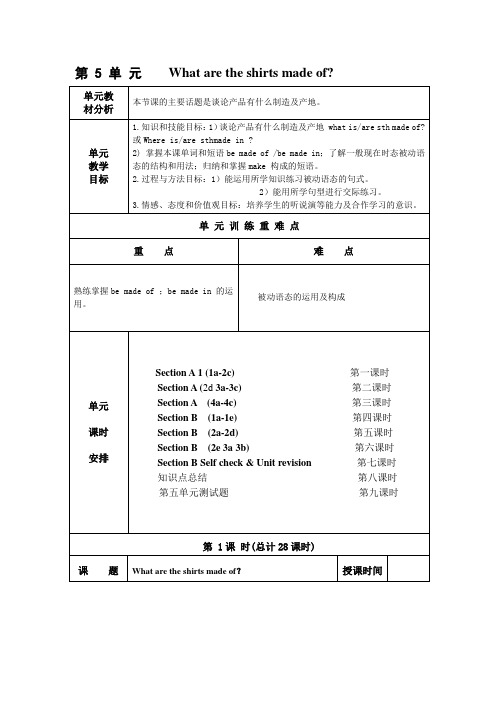
1.Master new vocabulary:
France, no matter, local,brand, avoid, product, handbag,mobile, everyday
2.Master the target language:
Whatis it made of?
It’smade ofused wood and glass.
第 5 单 元What are the shirts made of?
单元教
材分析
本节课的主要话题是谈论产品有什么制造及产地。
单元
教学
目标
1.知识和技能目标:1)谈论产品有什么制造及产地 what is/are sth made of?或Where is/are sthmade in ?
2) 掌握本课单词和短语be made of /be made in;了解一般现在时态被动语态的结构和用法;归纳和掌握make 构成的短语。
Step3.Listen
Try to learn the new words using “be made of” structure.
e.g.This pair of chopsticks are made of bamboo.
This coin is made of silver.
Is this blouse made of cotton?
—This ring looks nice. Is it made of silver?
—Yes, and it was made inThailand.
Whatis it made of?
It’smade ofused wood and glass.
牛津9A Unit5教案(共10课时)
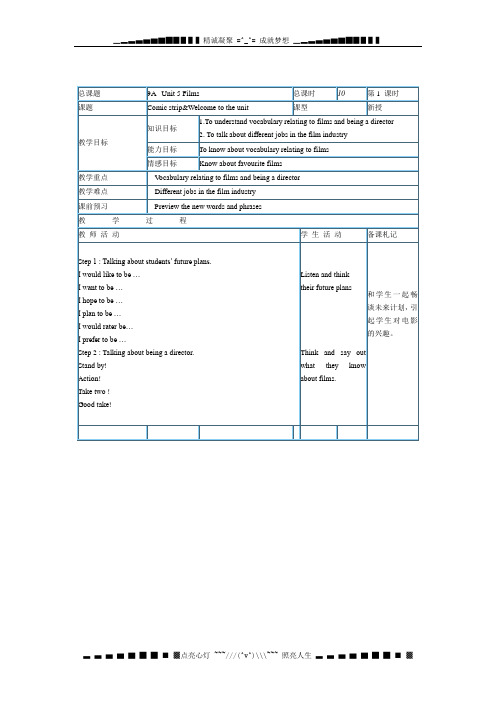
让学生了解电影以及做导演有关的词汇。
让学生认识到本单元的主题是电影。学习谈论不同类型的电影。
总课题
9A Unit 5 Films
总课时
10
第2课时
课题
Reading(A)
课型
新授
教学目标
课前预习
Preview the new words and phrases
教学过程
教师活动
学生活动
备课札记
Step 1 : Talking about students’ future plans.
I would like to be …
I want to be …
I hope to be …
I plan to be …
Get Ss to make an interview.
Here are some fans of Audrey Hepburn in our class.
They know much about Audrey. You can ask them to know more about Audrey
通过“情境导入—词汇教学——快速阅读—研读—拓展与延伸”等环节激发学生的兴趣,引导学生掌握一定的阅读技巧,了解文章基本概况。
Another one ! (Once more!) Take two!
A good job ! Good take!
Step 4: Presentation
Show two pictures of Eddie and Hobo.Explain the meaning :daydreaming be realistic
人教新目标英语九年级英语unit5(sectionA1a2d)优秀教学案例
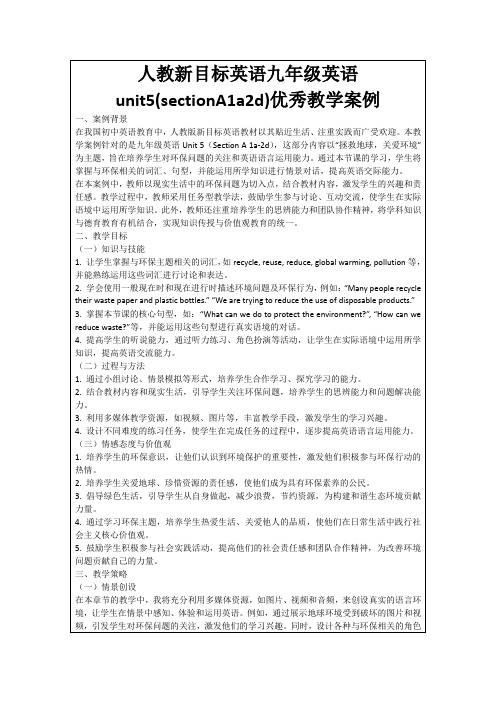
4.针对本节课的语法点,进行详细的讲解和举例,让学生在具体语境中理解和运用一般现在时和现在进行时。
(三)学生小组讨论
1.教师将学生分成小组,每组选择一个环保主题,如节约用水、减少塑料污染等。
2.小组内讨论如何用英语表达该主题的相关内容,并设计一段对话或一个小故事,展示环保行动的具体做法。
3.引导学生回顾已学的环保相关词汇和句型,为新课的学习做好铺垫。
(二)讲授新知
1.教师呈现本节课的主要教学内容,包括词汇、句型和语法点。
2.通过图片、例句等形式,讲解和演示新词汇和句型的用法,如:“recycle, reuse, reduce”, “What can we do to protect the environment?”等。
在本案例中,教师以现实生活中的环保问题为切入点,结合教材内容,激发学生的兴趣和责任感。教学过程中,教师采用任务型教学法,鼓励学生参与讨论、互动交流,使学生在实际语境中运用所学知识。此外,教师还注重培养学生的思辨能力和团队协作精神,将学科知识与德育教育有机结合,现知识传授与价值观教育的统一。
二、教学目标
(二)问题导向
以问题为导向的教学策略可以激发学生的好奇心和探究欲望。在本章节的教学中,我将设计一系列与环保主题相关的问题,引导学生思考、讨论和解决问题。例如:“What are the main environmental problems in our daily life?” “How can we reduce waste and protect the environment?”通过这些问题,让学生运用所学知识进行分析、推理和表达,培养他们的思维能力和解决问题的能力。
上海牛津英语9a教案

上海牛津英语9a教案教案标题:Unit 1: Our School Life教案目标:- 通过本单元的学习,了解和讨论学校生活的不同方面,包括学校设施、学科、课外活动以及学生与老师之间的关系。
- 培养学生的口语表达能力,使其能够流利地描述学校生活的不同方面并进行简单的对话交流。
- 培养学生的听说读写能力,提高他们在各种听说读写活动中的综合语言运用能力。
教学重点:- 学习和使用有关学校设施、学科、课外活动以及学生与老师之间的词汇和表达方式。
- 进行口语练习,通过对话交流的方式提高学生的口语表达能力。
- 通过听说读写的活动,培养学生的综合语言运用能力。
教学准备:- PPT或黑板,投影仪或板书工具。
- 学生课本和练习册。
- 课件或教具,包括图片、短视频片段等相关资源。
- 练习活动和练习册的复印件。
教学过程:Step 1: 导入新课 (5分钟)- 通过展示学校的图片或短视频介绍学校生活的主题,并引发学生对学校生活的思考和讨论。
- 引导学生用英语提出与学校生活相关的问题,例如:"What subjects do you study at school?"、"What facilities does your school have?"等。
Step 2: 词汇学习和讨论 (10分钟)- 呈现并讲解本单元的重点词汇和表达方式,包括学校设施、学科、课外活动以及学生与老师之间的相关词汇。
- 进行学生间的配对或小组对话,让他们使用新学的词汇和表达方式进行讨论,分享自己的学校生活经历。
Step 3: 听说练习 (15分钟)- 播放或阅读与学校生活相关的对话或文章,并提出相关问题。
- 结合对话和问题,进行学生间的配对或小组讨论,鼓励学生运用课堂上学到的词汇和表达方式进行交流和回答问题。
- 部分学生展示他们的回答以及他们的思维过程。
Step 4: 读写练习 (15分钟)- 分发练习册或复印本单元的阅读材料,并让学生阅读并回答相关问题。
2017-2018最新人教版初中初三九年级英语第五单元unit5教学设计(5页)备课教案教学设计教学反思导学案
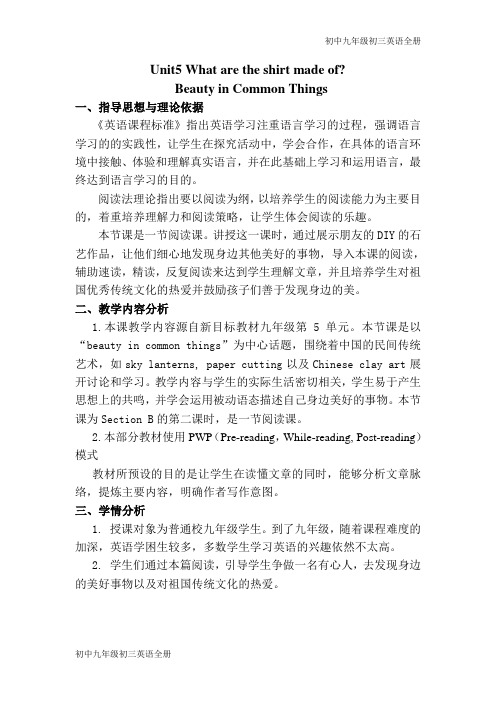
Unit5 What are the shirt made of?Beauty in Common Things一、指导思想与理论依据《英语课程标准》指出英语学习注重语言学习的过程,强调语言学习的的实践性,让学生在探究活动中,学会合作,在具体的语言环境中接触、体验和理解真实语言,并在此基础上学习和运用语言,最终达到语言学习的目的。
阅读法理论指出要以阅读为纲,以培养学生的阅读能力为主要目的,着重培养理解力和阅读策略,让学生体会阅读的乐趣。
本节课是一节阅读课。
讲授这一课时,通过展示朋友的DIY的石艺作品,让他们细心地发现身边其他美好的事物,导入本课的阅读,辅助速读,精读,反复阅读来达到学生理解文章,并且培养学生对祖国优秀传统文化的热爱并鼓励孩子们善于发现身边的美。
二、教学内容分析1.本课教学内容源自新目标教材九年级第5单元。
本节课是以“beauty in common things”为中心话题,围绕着中国的民间传统艺术,如sky lanterns, paper cutting以及Chinese clay art展开讨论和学习。
教学内容与学生的实际生活密切相关,学生易于产生思想上的共鸣,并学会运用被动语态描述自己身边美好的事物。
本节课为Section B的第二课时,是一节阅读课。
2.本部分教材使用PWP(Pre-reading,While-reading, Post-reading)模式教材所预设的目的是让学生在读懂文章的同时,能够分析文章脉络,提炼主要内容,明确作者写作意图。
三、学情分析1. 授课对象为普通校九年级学生。
到了九年级,随着课程难度的加深,英语学困生较多,多数学生学习英语的兴趣依然不太高。
2. 学生们通过本篇阅读,引导学生争做一名有心人,去发现身边的美好事物以及对祖国传统文化的热爱。
3. 学生已有的知识水平:学生们本单元已经学过被动语态,对于be made并不陌生,学生已经可以使用被动语态来表达自己的观点;九年级的学生已掌握了一定阅读的基本技能,有一定的词汇基础。
9AUnit 5 教案

dialogue.
1. Ask: What is Eddie doing? Do you think Eddie
really like it? What do you think Eddie loves exactly? 2. Read and act. Step 5 Play a game Choose different numbers and you will get different challenges
Listen to the tape carefully and try to find the answers to the questions.
Encourage the students to think them over. Step 6 Group work
Take on challenges
What does Tan Dun mean by saying that “My music is to dream without boundaries”? Give examples if necessary. Step 4 Further understanding Group work Express your own opinions: What does Tan Dun bring to you? V. Homework 1. Read the article again and write down your own understanding of the title. 2. Try to say something about Tan Dun according to the profile card on page 68 and share what you have learned in class next time.
初三第一轮复习9A第五单元教案
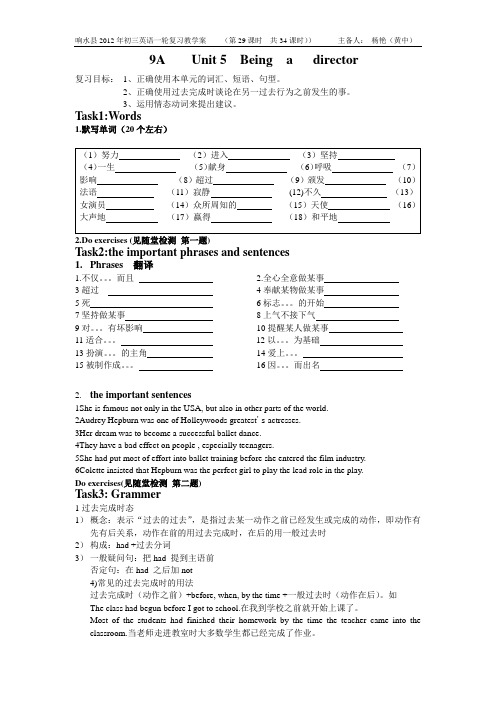
9A Unit 5 Being a director复习目标:1、正确使用本单元的词汇、短语、句型。
2、正确使用过去完成时谈论在另一过去行为之前发生的事。
3、运用情态动词来提出建议。
Task1:Words1.默写单词(20个左右)2.Do exercises (见随堂检测第一题)Task2:the important phrases and sentences1.Phrases 翻译1.不仅。
而且2.全心全意做某事3超过4奉献某物做某事5死6标志。
的开始7坚持做某事8上气不接下气9对。
有坏影响10提醒某人做某事11适合。
12以。
为基础13扮演。
的主角14爱上。
15被制作成。
16因。
而出名2.the important sentences1She is famous not only in the USA, but also in other parts of the world.2Audrey Hepburn was one of Holleywoods greatest's actresses.3Her dream was to become a successful ballet dance.4They have a bad effect on people , especially teenagers.5She had put most of effort into ballet training before she entered the film industry.6Colette insisted that Hepburn was the perfect girl to play the lead role in the play.Do exercises(见随堂检测第二题)Task3: Grammer1过去完成时态1)概念:表示“过去的过去”,是指过去某一动作之前已经发生或完成的动作,即动作有先有后关系,动作在前的用过去完成时,在后的用一般过去时2)构成:had +过去分词3)一般疑问句:把had 提到主语前否定句:在had 之后加not4)常见的过去完成时的用法过去完成时(动作之前)+before, when, by the time +一般过去时(动作在后)。
9A Unit5教案

9A Unit 5 Films Part 1: Teaching Design (第一部分:教学设计)Period 1 Comic Strip + Welcome to the unitTeaching GoalsTo understand vocabulary relating to films and being a directorTo talk about different jobs in the film industryTeaching ProceduresStep1. RevisoinWe’ve learned a lot about TV programmes. Can you tell me something ……Step2. PresentationToday, I’ll introduce something about films to you. Are you interested in film making I want to know if you ever read the credits at the end of a fim. If so, can you tell me all the different people who are involved in making a film. OK. I’ll show you on the blackboard.actor / actress, director, producer, make-up artist (化妆师), lighting manager, costume designer (服装设计师), set designer, sound mixer, film editor, cameraman etc.Sandy has joined the Drama Club. She wants to become a director. There are some pictures. Help Sandy find out what the director is saying. Match the instructions with the pictures in part A on page 77.Answes: 1. Stand by! 2. Action! 3. Take two! 4. Good take!(Explanation: “action” means “stand” or “go”.A “take” is a scene or part of a film.“Stand by” means “to wait and be ready for action”.Step 3. PracticeMake a dialogue like this, underlined words can be replaced.A: Would you like to be an actress B: Yes, I’d love to. What about youA: I don’t like acting very much. I’d rather be a director.Step 4. PresentationEddie likes watching TV very much. He thinks he’ll be tomorrow TV superstar. Does Hobo think so Let’s listen.Step and answerListen to the dialogue between Eddie and Hobo, then try to answer the following questions:1. Why does Eddie say Hobo is very lucky2. Does Hobo think Eddie will be a TV sperstar What does Hobo ask Eddie to do3. Is Eddie angry when he hears what Hobo says Why notStep 6. Read and actRead the dialogue after the tape, then act it out.(pay attention to their donation, emotion and signs.)Step 7. Consolidation改写句子1. He joined the Reading Club last month.(改为同义句)He was _________ _________ _________ the Reading Club last month.2. Do you know his age (改为同义句)Do you know ____________ ____________ he ____________3. She wants to be a writer. (对画线部分提问)____________ ____________ she ____________ to be4. Each of the students reads English every morning. (用now改写句子)Each of the students _____ ______ English now.汉译英1. 为什么你不停止讲话Why don’t you ________________________2. 再过五分钟他们会在这儿。
提高阅读理解能力:九下第五单元教案

提高阅读理解能力是非常重要的事情。
随着学生年级的升高,要求他们具有更高的阅读理解能力,逐渐深入到更深层次的阅读。
在九年级的第五单元教学中,提高学生的阅读理解能力也是教师要着重考虑和实施的一个目标。
在这篇文章中,我们将探讨如何提高学生的阅读理解能力。
教师应该注重学生的基础阅读能力。
当学生的基础阅读能力提高时,会对他们的阅读理解能力产生很大的帮助。
在教学中,可以让学生着重掌握一些关键词汇的拼读和意思,也可以使用一些高频词汇来扩充学生的阅读词汇量。
除了基础阅读能力的训练,教师还应该注重提高学生的阅读速度。
当学生的阅读速度快了,他们就能够更快地理解文章的核心内容,降低阅读疲劳的同时还能够提高阅读效率。
教师可以通过阅读测试的方式来考查学生的阅读理解能力。
测试形式可以有多种,如阅读理解题目、填空题等。
通过测试了解学生的阅读理解情况,发现学生的问题所在,再针对问题施以有目的的训练。
教师还可以利用辅助工具来提高学生的阅读理解能力。
如课外阅读、课内阅读等。
让学生有充分的时间看书,并且能够有机会和同学分享自己的读书心得,以此来提高学生的阅读理解能力。
同时,教师在讲解阅读材料时,也不能只满足于内容的粗浅讲解,应该让学生能够深入思考。
逐渐加深学生对于文章的理解和理解的深度,提高学生的阅读理解水平,使得学生能够真正地领悟到文章所表达的核心意义。
在这个信息时代,阅读能力的重要性越来越凸显。
提高学生的阅读理解能力,不仅是为了应付考试,更是为了帮助学生更好的适应未来的生活和工作。
所以在学校的教学中,提高学生的阅读理解能力必须得到教师重视和采取有效的方法。
- 1、下载文档前请自行甄别文档内容的完整性,平台不提供额外的编辑、内容补充、找答案等附加服务。
- 2、"仅部分预览"的文档,不可在线预览部分如存在完整性等问题,可反馈申请退款(可完整预览的文档不适用该条件!)。
- 3、如文档侵犯您的权益,请联系客服反馈,我们会尽快为您处理(人工客服工作时间:9:00-18:30)。
9A Unit 5 FilmsPeriod 1 Comic Strip + Welcome to the unitTeaching Goals•To understand vocabulary relating to films and being a director•To talk about different jobs in the film industryTeaching ProceduresStep1. RevisoinWe’ve learned a lot about TV programmes. Can you tell me something? ……Step2. PresentationToday, I’ll introduce something about films to you. Are you interested in film making? I want to know if you ever read the credits at the end of a fim. If so, can you tell me all the different people who are involved in making a film. OK. I’ll show you on the blackboard.actor / actress, director, producer, make-up artist (化妆师), lighting manager, costume designer (服装设计师), set designer, sound mixer, film editor, cameraman etc.Sandy has joined the Drama Club. She wants to become a director. There are some pictures. Help Sandy find out what the director is saying. Match the instructions with the pictures in part A on page 77.Answes: 1. Stand by! 2. Action! 3. Take two! 4. Good take!(Explanation: ―action‖ means ―stand‖ or ―go‖.A ―take‖ is a scene or part of a film.―Stand by‖ means ―to wait and be ready for action‖.Step 3. PracticeMake a dialogue like this, underlined words can be replaced.A: Would you like to be an actress? B: Yes, I’d love to. What about you?A: I don’t like acting very much. I’d rather be a director.Step 4. PresentationEddie likes watching TV very much. He thinks he’ll be tomorrow TV superstar. Does Hobo think so? Let’s listen.Step 5.Listen and answerListen to the dialogue between Eddie and Hobo, then try to answer the following questions:1. Why does Eddie say Hobo is very lucky?2. Does Hobo think Eddie will be a TV sperstar? What does Hobo ask Eddie to do?3. Is Eddie angry when he hears what Hobo says? Why not?Step 6. Read and actRead the dialogue after the tape, then act it out.(pay attention to their donation, emotion and signs.)Step 7. ConsolidationStep 8. Homework1. Revise today’s phrases.2. Write down the names of some famous directors and some films that are directed by them.3. Read and recite the dialogue.Period 2 Reading (I)Teaching goals•To understand key vocabulary related to a profile of Apburn·To place headlines in the correct chronological order·To identify statements as true or false based on the reading passageTeaching ProceduresStep 1. Revision1. Have a dictation2. We’ve already known a lot about TV programmes. Do you know some TV superstars? Can you tell me their names and their representative works.Step 2. PresentationDo you know some famous film stars? …… By the way, how many kinds of top film awards do you know? …… How much do you know about the Oscars? An Oscar is an award that is given in the USA each year for the best film, best actor, etc. in the film industry.Today, I’ll introduce a Hollywood’s all-time favourite film star called Audrey hepburn to you. First, I’ll show you some of her film pictures.1951 Gigi 1952 Monte Carlo Baby1953 Roman Holiday 1954 Ondine1954 Sabrina 1957 Funny Face1959 The Nun’s Story 1961 Breakfast at Tiffany’s1964 My Fair Lady 1967 Wait Until Park1989 Always 1993 Gardens of the World with Audrey HepburnStep 3. Listen & ReadRead the passage on page 78 and 79 while you listen to the tape, try to get some information about Audrey Hepburn, then answer the following:1. When and where was she born?2. When did she die?3. Before she entered the film industry, what did she want to become?4. Why did people say she was also a great humanitarian?5. From the passage, how many work are mentioned?Step 4. PracticeAsk the students which of Audrey Hepburn’s films they like most. Then encourage them to respond orally using the following construction:―My favourite Audrey Hepburn film is …, because …‖Step 5. Read1. Read the passage again, then ask the students to read the words and definitions in part B1, on page 80, then complete part B on their own.Answers: b, c, b, b, a, a2. Ask the students to read the passage again, then tell the following sentences ―true‖ or ―flase‖in part B2 on page 80.Answers: F, F, T, F, F, T, T, T,Step 6. Listen, read & retellListen to the tape, then read it after the tape, afterwards retell the passage according to the following main words and phrases:be born in Belgium, a successful ballet dancer, put all the effort into, beauty and charm, play the lead role, win an Oscar for Best Actress, earn four more Oscar nominations, protect the environment, vote much time to the charity, pass away peacefullyStep 7. ConsolidationStep 8. Homework1. Read the text and try to recite it.2. Copy the important words and phrases two timesPeriod 3 Reading (II)Teaching Goals•To practise the main language points of the contextTeaching ProceduresStep 1. Revision1. Have a dictation1) mourn the loss of a great humanitation 2) become a successful ballet dancer3) put all the effort into …4) beauty and charm 5) play the lead role6) mark the beginning of successful career 7) final appearance in films8) devote the time to charity 9) present sb. with sth. 10) pass away peacefully2. Read the passage, then tell something about Audrey Hepburn with their own words.Step 2. Practice3. Stick the first halves of the film titles on the board. Take the second halves of the film titles, fold them and put them in a bag.4. Divide the class into five groups. Each group picks one piece of paper out of the bag. Theythem match it to the first half of a film title on the board.Step 4. Explanation1. devote (v.) to use all or most of your time, attention, effort, etc. in order to do something or help someonee.g. She devoted herself to her career.2. effort (n.) energy that is needed to do somethinge.g. Tom lifted the heavy box without using much effort.3. environment (n.) the natural world in which people, animals and plants livee.g. We should try our best to prevent the pollution of the environment.4. industry (n.) business that produce a certain type of thing or provide a particular servicee.g. I work in the oil industry.5. lead (n.) the main part in a play or a filme.g. Who was playing the lead role in the film?6. mourn (v.) to feel very sad because someone has diede.g. Many people came to mourn those who died in the war.Step 5. ConsolidationStep 5. Homework1. Revise the phrases and recite the text2. Do some more consolidation exercisesPeriod 4 VocabularyTeaching Goals:·To use vocabulary to talk about different types of filmsTeaching Procedures:Step 1. RevisionSay some kinds of TV programmes: cartoon, comedy, game show, documentray, chat show, drama seriesStep 2. PresentationShw some pictures in part B on page 82. These are VCD covers, each cover represents one of the categories, can you guess what type they are. If students can’t tell them all correctly, the teacher can help them.1. cartoon2. romantic film3. action film4. science fiction film5. western6. horror film Step 3. PracticeDo you know something about these types of films. There is some information about different types of films in part A on page 82, ask the students to match these types of films with the descriptions.Answers: e, b, f, a, d, c(Explanation: Horror films generally involve a lof of blood or violence. ―Thrillers‖ don’t necessarily involve these things, but we use suspense to creat a tense atmosphere.A romantic film is often simply called a ―romance‖.)Step 4. Extension activityAsk students if they can think of any films belong to the categories in part A. Encourage them to think of as many examples as possible.We can also list some films on the blackboard for students to categorize. Ask students to think of other kinds of films that are not listed. Encourage them to give their answers orally.e.g. comedy, epoc, historical film, thriller, war film, documentrayStep 5. Consolidation ExerciseStep 6. Homework1. Revise the phrases we learned today.2. Do some more consolidation exercises.Period 5 Grammar (I)Teaching Goals:·To use the past perfect tense to talk about past actions·To use the past perfect tense to ask questions about past actionsTeaching Procedures:Step 1. RevisionRevise something about the present perfect tense.Do some translations orally:1. He has learned English since 4 years ago.2. We have been good friends for a long time.3. How long have you known Audrey Hepburn?4. How many films that Audrey Hepburn acted in have you seen?Step 2. PresentationKitty and her classmates went to see a film called ―My Fair Lady‖. However, some of them were late. There are some reasons.1. Millie ran back to school because she had left her magazine in the classroom.(―Mille left her magazine in the classroom‖ happened first.)2. Simon left school late because the football game had started late.(―The football game started late‖ happened first.)3. Daniel arrived out of breath because he had gone to the wrong cinema.(―He went to the wrong cinema‖ happened first.)4. Amy had to go to the police station because she had lost her purse.(―She lost her purse‖ happened first.)―had + past participle‖ is the form of the Past Perfect Tense . We use it to talk about an action that happened before another action in the past. We use contractions when we write to our friends or when we speak. e.g. I’d …Step 3. Practice1. Sandy wrote about going to the cinema in her diary, but she was not sure how to use the past perfect tense. So she decided to practise using the tense by completing a table in part A2 on page 84. Help her to finish it.2. Help Sandy to complete the diary entry she wrote earlier in part A3 on page 84.Answers: 1. arrived 2. had bought 3. came 4. had gone 5. arrived 6. had finished7. rushed 8. had started(Tip: We often use ―after, before, when‖ with the past perfect tense.)Step 4. ConsolidationMake one sentence using the past perfect tensefor the earlier action and the simple past tense forthe later action. Use ―when‖ or ―after‖ as shown.1. We fed the dog. Then we took it for a walk. (after)2. Millie finished her homework. Then she watched a film on TV. (after)3. The film started. I arrived at the cinema. (when)4. Chow Yun Fat was famous in Asia for many years. Then he went to America. (when)5. We went shopping. We went to the cinema. (after)6. Simon finished playing football. He went home. (when)Step 5. PresentationWhen we ask questions using the past perfect tense, we often put ―had‖ in front of the sentence. ―had‖ is used with all pronouns, without any change in form.Step 6. PracticeMillie is chatting online with Sandy about a film she saw druing the holiday. Fill in the blanks in part A4 on page 85.Answers: 1. Had, seen 2. had 3. had acted 4. Had, watched 5. hadn’tStep 7. ConsolidationStep 8. Homework1. Revise the past perfect tense2. Do more extra translationsPeriod 6 Grammar (II)Teaching Goals:·U se ―should‖, ―ought to‖, ―had better‖, ―have to‖ and ―must‖ to give advice·Learn to use ―why not‖, ―why don’t you‖ and ―perhaps‖ to give adviceTeaching Procedures:Step 1. RevisionDo some translations orally:1. After we had fed the dog, we took it for a walk.2. After Millie had finished her homework, she watched a film on TV.3. When I arrived at the cinema, the film had started.4. When Chow Yun Fat went to America, he had seen famous in Aisa for many years.5. After we had gone shopping, we went to the cinema.6. When Simon had finished playing football, he went home.7. When I arrived, she had bought the tickets already.8. Just before they came, I had gone to buy some drinks.9. Had you seen any of her films before you saw this one?10. Audrey Hepburn had put all her effort into ballet dancing before she entered the filmindustry.Step 2. Presentation-- What are you going to do next Sunday?-- Nothing much.-- Why not / Why don’t you go to the cinema?-- Good idea.We can use ― why not, why don’t you‖ to give avice.Before you go to the cimena, you have to tell your parents. / you had better finish your homework. / you must know the time. / you ought to choose to watch the Western films toimprove your English. / perhaps you should take your little brother with you.We can also use ―should‖, ―ought to‖, ―had better‖, ―have to‖ or ―must‖ to give advice. They don’t change forms no matter who /what the subject is.(pay attention: The negative form of ―ought to‖ is ―ought not to‖. The negative form of ―have to‖ is ―to do‖ + not + ―have to‖.e.g. I don’t have to go to school tomorrow.Step 3. Practice1. If you go to the cinema, what should or should not you do at the cinema? What about Kitty? Please help her choose the correct answers in brackets on page 86.Answers: 1. had better 2. ought to 3. had better 4. have to 5. should2. Millie has some problems, can you give hre some advice politely?Show the students Millie’s problems, sk the students to give her their own advice. Kitty also helps Her, help Kitty fill in the blanks by using the words in brackets on page 87.Step 4. ConsolidationStep 5. Homework1. Revise how to give advice2. Do some more consolidation exercisesPeriod 7 Integrated SkillsTeaching Goals:·To identify the context of a cinema hotline·To identify key points to complete some notes about three different filmsTeaching ProceduresStep 1. Revision & presentationWhat types of films are they?The pig brothers ---- cartoonJohnny and Elly ---- romantic film4098BC ---- science fiction filmTomorrow Never Runs ---- action filmThe New King of the West ---- WeaternGraveyard Midnight ---- horrow filmWhat type of film is your favourite? Why?Sandy and Kitty are talking about different kinds of films. Listan and answer, then make the similar dialogue in part B on page 89, repalce the underlined words with your own ideas.Step 2. PracticeWork in pairs, talk about their different ideas about the different types of films.Some useful vocabulary:fantasy, relax, angry, funny, romance, awful, funny, angry, happy, sad, boring, scary, interesting, special effects, joke, exciting, terrible, thoughtful, unrealisticStep 3. PresentationThere is a film festival in Sunshine Town. Sandy is the member of the Drama Club. He’s writing a report on some of the fimls. Look at Sandy’s film guide in Part A1 on page 88, then fill in as many blanks as possible according to the information you have read in the table.Listen to the tape carefully, try to tell the types and the storylines of the following three films. Then fill in the rest blanks in part A1 on page 88.Answers: 1. 3-hour 2. many years 5. a family that lived in the hutongs 6. science fiction film 10, a baby dinosaurs 11. future king 12. horror 15. rich 16.killedStep 5. PracticeHelp Sandy complete the report. You can use the information in part A1 on page 88. Then read it.Step 6. ConsolidationStep 7. Homework1. Revise the expressions.2. Do more extra consolidationsPeriod 8 Study skillsTeaching Goals·To respond to otheres’ opinions·To respond correctly in agreement or disagreementTeaching ProceduresStep 1. RevisionWhat kind of film is your favourite? Why?I like action film very much. They’re the most exciting films. Do you think so?(Yes, I think so. / Yes, I agree.No, I don’t think so. / No, I don’t agree. / I disagree.I like cartoons best. Because they are interesting and often make people laugh.)Step 2. PracticeWork in pairs to talk about their likes and dislikes. You can use the following information. Cartoons – interesting, make people laugh / uninteresting, childishActor film – exciting / fights have bad effect on people, especially teenagersHorror film – active / make people scaredRomantic film – relaxing, have happy endings / boringScience fiction film – imaginative / unrealisticWestern – amazing / too oldStep 3. PresentationEveryone has different opinions. Sometimes you agree with people but sometimes you disagree. There are some useful phrases in English that you can use to express agreement and disagreement. For stronger classes, ask the students to think of these expressions on their own. For weaker classes, ask the students t finish the table in part A on page 90.Step 4. Listen & answerSandy and Millie are discussing a film they watches yesterday. Listen to their conversation in part B on page 90, then answer te following questions:1. Wht kind of film does Sandy like? Why?2. Does Millie like action films too?3. Who played the lead role in the film called Action?4. Does Sandy think John Adams play his part well?Read the dialogue, then take turns to be Sandy and Millie. You can use different expressions to talk about your ageement and disagreement.Step 6. Extension activityAsk pairs of students to talk about a film or a TV programme they have both seen or are familiar with. Tell them to use the phrases in part A to express agreement and disagreement. Step 7. ConsolidationStep 8. Homework1. Revise some useful phrases to express agreement and disagreement2. Do more consolidation exercisesPeriod 9 Main taskTeaching Goals·To read about a famous film star·To write a fact sheet about a favourite film star·To complete an article about a film star·To write an article about a favourite film star for a websiteTeaching ProceduresStep 1. RevisionHow many kinds of film do you know?What is your favourite? Why?Who is your favourite film star? Why?What film that was acted by him/her have you ever seen?What awards did he /she get?Step 2. PresentationI like Gong Li best. I’ve known something about her. I know what and where she was born, her Appearance and some films she acted in and the awards she got.Step 3. Read & PractiseThere’s a website about Gong Li. Read the fact sheet about her in part A1 on page 91, try to tell me more information, then fill in the blanks in part A2 on pages 91 and 92.Then read out the article. Pause at the blanks and ask the students to volunteer answers.Step 4. Extension activityAsk students whether they like Gong Li or not. Ask them to respond orally using the following constructions:Yes, I like Gong Li, because she …No, I don’t like Gong Li, because she …Step 5. WritingWho is your favourite film star? Write about him or her. You should try to write their personal details and acting career. Work in pairs, fill in the fact sheet in part B on page 92 with as much information as they know. You can find out more about your favourite film star from the Internet. You can also add in the information that is not listed on th fact sheet. There are no right or wrong answers here.Step 6. ConsolidationStep 7. Homework1. Write a complete passage according to your own drafts.2. Do more consolidation exercisesPeriod 10 CheckoutTeaching Goals·To review the use and structure of the past perfect tense·To review vocabulary related to the film industry·To allow students to check their progress and ask any questions they may still haveTeaching ProceduresStep 1. RevisionNow, I wish I could be a director. I want to be more relistic and want to know more about films.I know you have known the films very well. Could I ask you some questions and check your study at the same time?First, I want to know the names of all types of films. (Revise vocabulary)Second, before I started my films, I should learn fome others. I hear Hollywood has many excellent filmss to see, do I have to go there to see these excellent films? Will you please give me some advice? (Revise Grammar B,C)Third, what film do you wish me to direct? Why? Do you agree or disagree others’ opinions? (Revise Spek up & Study skills)Then, which famous actors or actresses will you advise me to invite in my film? Can you tell me more about him or her? Maybe you can write an article to recommend him or her. (Revise Main task. Ask the students to write the similar article after class.) I think my main astress should be like my favourite actress—Audrey Hepburn. Do you know her? Will you share the things you know about her with me? (Revise Reading and Grammar A)After I invite th best actors or actresses. What professional language should I say as a director? (Revise Welcome to the unit)Step 3. PresentationThanks a lot. You know Eddie is sure he will be Tomorrow’s superstar. Will it become true? One day, Millie had a dream. In her dream, Eddie was an actor. Look at the pictures in part B on page 93, then fill in the blanks. Millie also dreamt she went to the cinema with Eddie and Hobo to see the film. While the film was showing, Eddie kept talking to Hobo. What are they takling about?Step 4. Read & answerRead part A on page 93, First use the correct forms of the verbs in brackets and choose the correct phrases or words to complete what they said. Then answer the following questions:1. Before Eddie came to the cinema, had he seen a film?2. What did Eddie ask Hobo to do?3. Where had Hobo put the money before they left?Step 5. ConsolidationStep 6. Homework1. Revise the vocabulary and grammar in this unit.2. Get ready for the coming test.。
